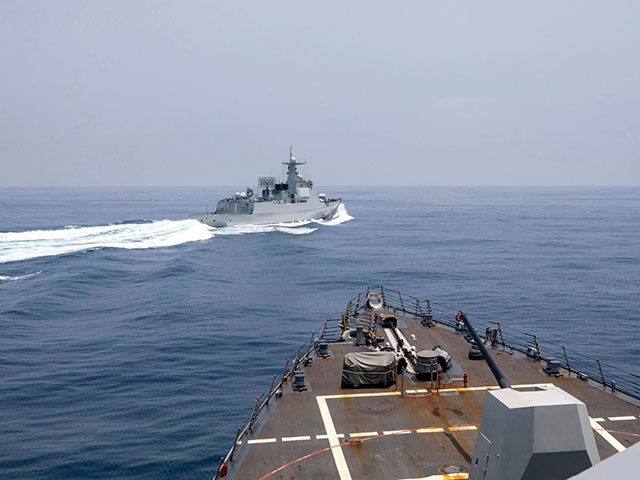The Chinese Communist government on Sunday claimed the People’s Liberation Army (PLA) appropriately handled a “provocative transit” by American and Canadian warships through the Strait of Taiwan on Saturday.
The U.S. Navy released footage of a Chinese ship making an “unsafe interaction” by cutting across the bow of an American destroyer, closing to within 150 yards.
WATCH: Chinese Navy Ship Harasses U.S. Destroyer During Taiwan Strait Maneuver:
Video Source: U.S. Navy / LOCAL NEWS X /TMXThe U.S. Indo-Pacific Command (USINDOPACOM) said the destroyer USS Chung-Hoon and Canadian frigate HSMC Montreal were making a routine south-to-north passage through the Taiwan Strait on Saturday when the PLA ship “overtook Chung-Hoon on their port side and crossed their bow at 150 yards,” violating the “maritime Rules of the Road” for safe passage.
“Chung-Hoon and Montreal’s transit through the Taiwan Strait demonstrates the combined U.S.-Canadian commitment to a free and open Indo-Pacific. The U.S. military flies, sails, and operates safely and responsibly anywhere international law allows,” USINDOPACOM said.
Canadian Defense Minister Anita Anand said the Chinese behaved “irresponsibly” during the incident.
“We want to make sure that we are doing our best to uphold peace and security in this region, but also to ensure that international rules and norms are recognized,” Anand said.
“Canada will continue to sail where international law allows, including the Strait, and the South China Sea. Our overall goal is to increase the peace and stability of this region,” she said.
“The measures taken by the Chinese military are completely reasonable, legitimate, and professional and safe,” insisted Chinese Foreign Ministry spokesman Wang Wenbin on Monday.
“The U.S. had caused trouble and provocation first, while China dealt with it in accordance with the law and regulations afterwards,” Wang said, without citing any such laws or regulations.
China’s state-run Global Times applauded the PLA for “showing determination and capability in countering the provocation.”
Like Wang, the editors could not come up with anything specific the American and Canadian ships did wrong, instead claiming they “deliberately stirred up trouble and risk in the Taiwan straits” and “maliciously undermined regional peace and stability” just by being there.
The Global Times compared the naval intercept to a dangerous aerial interception performed by a PLA jet fighter against an American reconnaissance plane over the South China Sea on May 26 – and even though video evidence in both cases showed the Chinese military acting aggressively and irresponsibly, the Global Times said blame for any accidents or hostilities would fall on the Americans for being in airspace or waters claimed by China.
“Both incidents were caused by U.S. provocations in sensitive regions on China’s doorsteps, followed by U.S. failure to listen to Chinese radio warnings, led to professional PLA tactical maneuvers, which were then hyped by Western media attempting to shift blame to China, hype ‘China threat’ and pressure China on the Shangri-La Dialogue,” the Global Times hyperventilated.
The Shangri-La Dialogue is an annual regional military conference held in Singapore. The Global Times essentially suggested the U.S. was trying to make the PLA look bad at the conference by forcing it to make aggressive maneuvers, undermining China’s posturing as a responsible regional power looking for peaceful relations with its neighbors.
“It showed that the U.S. has no sincerity at all in communicating with the Chinese side, and if any accident happens, it would be the US who must shoulder the blame,” the Global Times thundered.
Former Global Times editor and belligerent nationalist Hu Xijin applauded the PLA for its “professional and accurate interception” of American ships and planes in a video commentary.
Hu blamed the U.S. for not informing China of the exact position of its craft. Apparently failing to understand the definition of “international airspace,” Hu said the U.S. recon plane coming “very close” to South China Sea islands and reefs claimed by Beijing was justification for launching the aggressive interception flight.
“The U.S. military is the most hegemonic army in the world, and its aircraft and warships’ close-in actions toward China’s territory, territorial waters, and airspace seriously threaten China’s national security, which the PLA must defend against,” Hu railed.

COMMENTS
Please let us know if you're having issues with commenting.